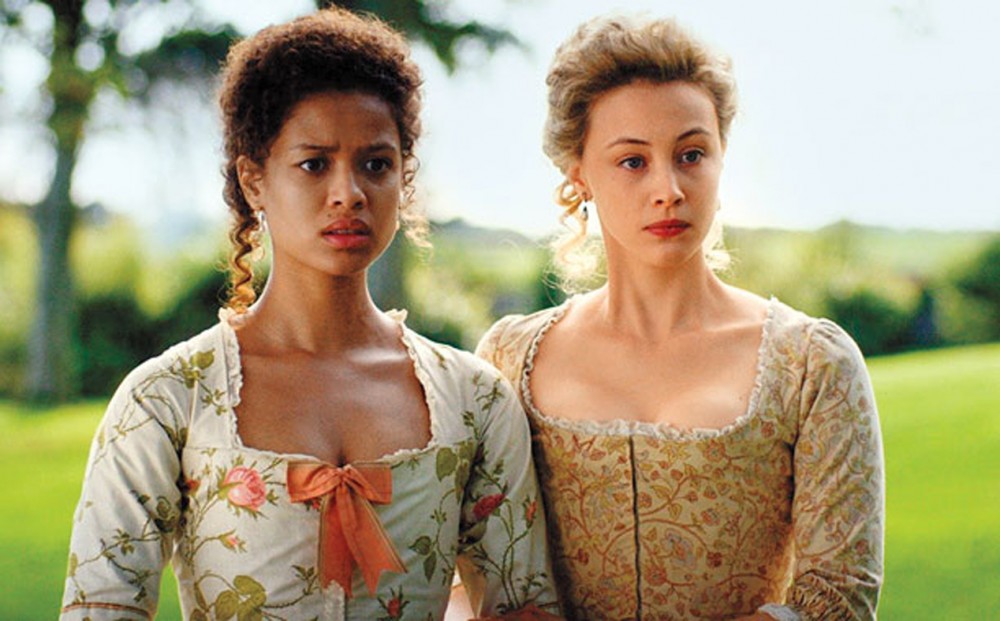Newlyweeds is a colorful film. Voices are punctuated with the language of Jamaicans, Latinos, and native New Yorkers. The sartorial palette is bright with floral patterns on Nina’s (Trae Harris) pants, and Lyle’s (Amari Cheatom) tight pink jacket, which inexpectedly hugs his shoulders when he wakes up on the floor of a subway car. The lives of Nina and Lyle, the twenty-something Brooklyn couple, are equally colorful.
Depending on whether the glass is half full or half empty, colorful can be interpreted as bright and fun and exciting. Quite possibly it could also represent the fickle behavior of young folks who haven’t yet learned that adulthood denotes some form of responsibility and settling down.
But rather than settle in, it’s all weed, love, and happiness.
In Newlyweeds, Lyle and Nina smoke weed, as the title of the movie suggests, like it is their job. In actuality, they merely hold what most would define as transient jobs.
Nina gives tours to schoolchildren at a local museum. In the repossession line of work, Lyle’s daily routine involves chasing people down in a rusty van to retrieve unpaid appliances on loan from the Rent-to-Own store. He certainly has some eventful days, but when eventful means humiliating a man who is poor, crippled, and barely speaks a lick of English by accidentally removing his appliances and failing to return them—that’s when eventful becomes downright unrewarding.
There’s a moment of clarity and shame when Lyle realizes he does The Man’s dirty work. He’s that guy who can’t give another guy down on his luck a break. There surely can’t be much happiness in that. Rightly so, Lyle envisions his happiness to lie somewhere far away in the Galapagos Islands, the one place he thought he’d like to visit more than anyplace in the world. It becomes apparent that both Lyle and Nina want a fresh start away from the hustle and bustle of the concrete jungle. They seek a place to hopefully rekindle their fragile relationship and their verve for life.
In these twenty-something characters, director/writer Shaka King, in his feature directorial debut, illustrates a complex portrait of an age group that is so often portrayed as one-dimensionally naïve and misdirected. Some part of the narrative is a social commentary on weed, and its effects, or lack thereof, on the daily existence of young people in an urban milieu.
In some ways, King asserts that productivity and weed cannot coexist if Lyle and Nina are to progress to further stages in their work and relationship lives. Though given the number of successful politicians, television personalities, and so forth who admittedly light up on many an occasion, arguably most of the social world would have to disagree with this premise.
There’s a comedic light at the end of the dramatic tunnel of Nina and Lyle’s experiences with marijuana. Neither character is permanently harmed, disrupted, or scarred by their habit, although each learn swift lessons from minor run-ins with the law that in these days of stop, frisk, and arrest seem inevitable for two young black hash connoisseurs.
Ironically for Lyle who is in the business of repossessing things, he experiences his most prized treasure snatched from beneath him when Nina is suddenly “repossessed” by her parents and jerked out of Lyle’s life—the two become a restraining order’s length away. Lyle has spent the entire film unfailingly taking back things that—although people had invested time, money, and fond memories in them—didn’t really belong to people. Certainly Nina is no beloved Frigidaire, but the lament is all the same.
The analogy makes you wonder whether Nina, with mom and dad tucked comfortably behind a double-doored Brooklyn brownstone, was simply a luxury Lyle couldn’t afford. The other man, Chico (Colman Domingo), Nina meets who works with her at the Brooklyn Children’s Museum appears to be more along the lines of her pedigree. He wears tweed jackets and striped sweaters. Like Nina, he has traveled the world, or at least seen a part where the MTA doesn’t reach.
Lyle starts to see that Nina could maybe see something different, besides him, attractive. And suddenly he wants to take her dream seriously.
They start to save up for that day when their dream to venture off into the islands can become a reality. But how much of their dream is just that—fantasy—and how much can we take seriously? Is it the weed talking or is their subconscious gasping painfully for breath.
Whether their desire to leave Brooklyn for good is only a pipe dream or a genuine stab at self-betterment is left up in the air. (What would an independent movie be without an ambiguous ending?)
Lyle is shot through the window of a cab in a blurred haze, a lens though which he has seemingly experienced most of his adult life. In the end, we don’t know if his daydreaming vision suggests that Nina and Lyle, together, are Galapagos-bound or if it is all just smoke and mirrors.









